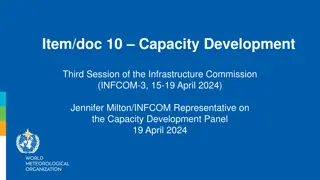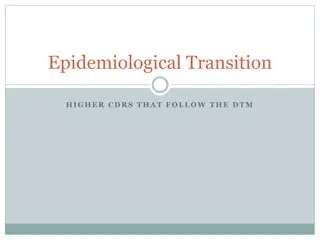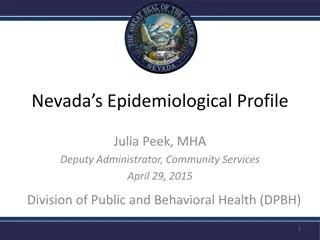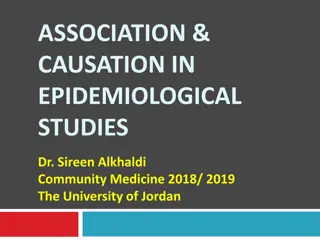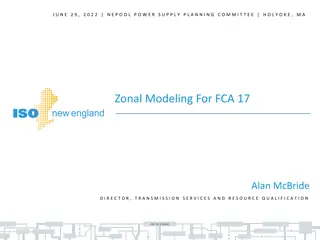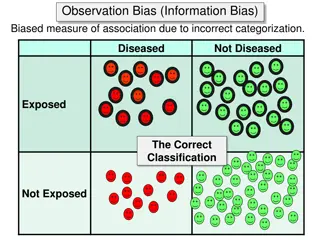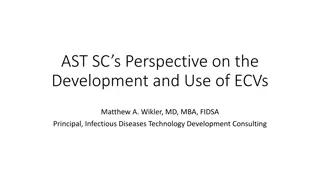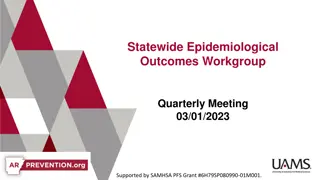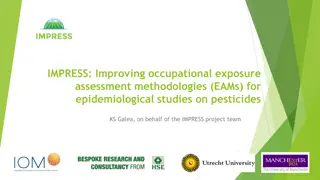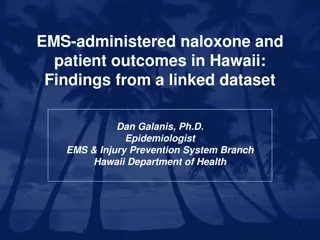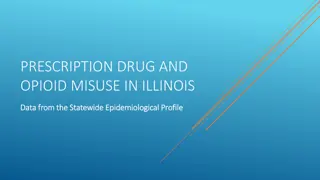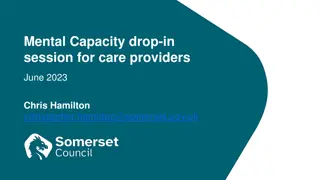Enhancing Public Service Professionalization Through National School of Government Positioning
This presentation outlines the strategic response to public service reform towards professionalization by positioning the National School of Government (NSG) to build state capacity, address deficiencies in various departments, and strengthen governance for effective service delivery in South Africa
0 views • 19 slides
Resource Capacity Accreditation in the Forward Capacity Market
The presentation discusses the Resource Capacity Accreditation (RCA) project in the Forward Capacity Market (FCM) by ISO-NE, aiming to improve accreditation processes to support a clean-energy transition. It emphasizes modeling and accrediting gas and oil resources for resource adequacy as the energ
0 views • 38 slides
Partnership between Low and Low-medium income countries to boost health. systems
This presentation highlights the common challenges faced by low and low-medium income countries in boosting their health systems, such as political instability, lack of funding, and unstructured healthcare systems. It emphasizes the importance of collaborative efforts between these countries to addr
6 views • 6 slides
INFCOM Capacity Development Initiatives Overview
INFCOM's capacity development initiatives focus on enhancing Earth system observations, closing capacity gaps on weather services, and supporting new opportunities in competencies and capabilities. Collaboration and coordination mechanisms have been established to facilitate sharing of information a
0 views • 11 slides
Colorado State Epidemiological Profiles - Substance Abuse Trends & Response Task Force
The Colorado State Epidemiological Profiles provide a state-level overview of data from various surveillance sources for prevention, intervention planning, monitoring, and evaluation. The profiles cover demographics, alcohol, marijuana, opioids, sustainability, and next steps. Updated every 2 years,
0 views • 12 slides
Understanding the Epidemiological Transition Stages
The Epidemiological Transition model explains shifts in causes of death at different stages of demographic transition. From pestilence and famine to delayed degenerative diseases, each stage highlights key factors influencing mortality patterns. By recognizing these transitions, healthcare professio
0 views • 8 slides
Understanding Epidemiological Profiles in Public Health Practice
Epidemiological profiles play a crucial role in substance abuse and mental health planning, helping professionals prioritize issues and raise awareness. The profiles include quantitative and qualitative data to analyze behavioral risk factors, consumption patterns, and clinical outcomes, sourced fro
1 views • 13 slides
FDA Perspective on Epidemiological Cut-off Values (ECVs)
The FDA presents insights on the development and use of Epidemiological Cut-off Values (ECVs) to distinguish wild-type populations from those with acquired resistance mechanisms. ECVs are crucial for determining antimicrobial susceptibility and guiding treatment decisions. The process involves analy
0 views • 13 slides
Understanding Epidemiological Study Designs and Measures of Risks
This informative content covers various epidemiological study designs, including observational and experimental studies, clinical trials, cohort studies, and more. It explains the concept of cohorts, indications for cohort studies, and the design considerations involved. Images are included to illus
6 views • 41 slides
Understanding Association and Causation in Epidemiological Studies
Exploring the concepts of association and causation in epidemiological studies, this content delves into the complexities of determining if exposure leads to disease risk. It discusses different types of associations, such as spurious, indirect, and direct causal associations, illustrating the chall
5 views • 43 slides
Resource Capacity Accreditation in Forward Capacity Market Overview
Resource Capacity Accreditation project aims to enhance ISO-NE's accreditation processes in the Forward Capacity Market, supporting a reliable, clean-energy transition. Key concepts covered in this educational presentation include accreditation space, methods, benefits, challenges, and improvement o
1 views • 53 slides
Resource Capacity Accreditation in the Forward Capacity Market Discussion
The presentation discusses improvements in the Resource Capacity Accreditation project of ISO-NE's Forward Capacity Market to support a reliable, clean-energy transition. It includes details on seasonal components, reconfiguration auctions, trading obligations, and stakeholder schedules. Examples pr
3 views • 71 slides
Capacity Zone Modeling for Forward Capacity Auction 17 Results
This presentation unveils the Capacity Zone modeling calculations for Forward Capacity Auction 17 associated with the 2026-2027 Capacity Commitment Period by ISO-NE PUBLIC. It delves into boundary definitions, import-constrained zone modeling, and market rules guiding the assessments and modeling pr
0 views • 16 slides
Types of Bias in Epidemiological Studies
Bias in epidemiological studies can arise from misclassification of observations and exposures, leading to incorrect associations between variables. Observation bias, misclassification bias, and non-differential misclassification can impact the accuracy of study results, either minimizing difference
1 views • 11 slides
Proposal for Resource Capacity Accreditation in Forward Capacity Market
The ISO-NE has proposed improvements to the accreditation processes in the Forward Capacity Market (FCM) through the Resource Capacity Accreditation (RCA) project. The aim is to enhance the accreditation of resource contributions to ensure reliability during the transition to a cleaner energy mix. T
0 views • 59 slides
Overview of Epidemiological Cutoff Values (ECVs) in Antimicrobial Susceptibility Testing
Epidemiological Cutoff Values (ECVs) are crucial in determining antimicrobial susceptibility by distinguishing wild-type and non-wild-type microbial populations. ECVs are defined based on factors like minimal inhibitory concentration (MIC) and genetic variation, and are determined through specific m
0 views • 16 slides
Understanding Inverse Probability Weights in Epidemiological Analyses
In epidemiological analyses, inverse probability weights play a crucial role in addressing issues such as sampling, confounding, missingness, and censoring. By reshaping the data through up-weighting or down-weighting observations based on probabilities, biases can be mitigated effectively. Differen
0 views • 25 slides
Understanding Directed Acyclic Graphs (DAGs) for Causal Inference
Directed Acyclic Graphs (DAGs) play a crucial role in documenting causal assumptions and guiding variable selection in epidemiological models. They inform us about causal relationships between variables and help answer complex questions related to causality. DAGs must meet specific requirements like
1 views • 63 slides
Resource Capacity Accreditation in the Forward Capacity Market: Continued Discussion and Detailed Design
The Resource Capacity Accreditation (RCA) project by ISO-NE aims to enhance accreditation processes in the Forward Capacity Market (FCM) to support a reliable, clean-energy transition. This presentation focuses on seasonal components of Capacity Supply Obligations (CSO), Pay-for-Performance (PFP) ob
0 views • 58 slides
Statewide Epidemiological Outcomes Workgroup Quarterly Meeting Overview
This overview captures the key discussions of the Statewide Epidemiological Outcomes Workgroup Quarterly Meeting. Topics included the NSDUH, Monitoring the Future survey, Youth Risk Behavioral Surveillance Survey, Arkansas Department of Human Services Annual Report, and Crime Information Center data
1 views • 9 slides
Understanding Self-Neglect, Hoarding, and the Mental Capacity Act (2005)
Self-neglect and hoarding are complex issues often intertwined with mental capacity challenges. The Mental Capacity Act (2005) outlines capacity assessments, decision-making criteria, and challenges faced by professionals in safeguarding individuals. Recognizing the need for trauma-informed care in
1 views • 16 slides
Understanding Legal and Mental Capacity in Healthcare Decisions
Clinical specialist occupational therapist, Louise Lawlor, advocates for patients' rights and decision-making capacity in healthcare settings. She emphasizes the importance of legal and mental capacity in making informed decisions, highlighting relevant legislation, guidance documents, and a functio
0 views • 24 slides
Enhancing Pesticide Exposure Assessment for Epidemiological Studies
Focuses on IMPRESS project aiming to improve methodologies for assessing occupational pesticide exposure in epidemiological studies. Reviews challenges in retrospective exposure assessment, proposes methodologies, and presents key project results to date, emphasizing the use of various exposure asse
1 views • 15 slides
Exploring Capacity and Volume in Practical Settings
Explore the concepts of volume and capacity through engaging activities involving measuring liquid in containers, understanding units like milliliters and liters, and solving capacity-related questions. Discover how to work out different measurements and practice practical capacity in the kitchen wi
0 views • 7 slides
EMS-Administered Naloxone and Patient Outcomes in Hawaii: Epidemiological Study
This study presents findings from a linked dataset analyzing EMS-administered naloxone and patient outcomes in Hawaii from 2012-2016. Part 1 covers basic epidemiological descriptions and linkage to hospital billing data, while Part 2 investigates associations between EMS response times and patient o
0 views • 14 slides
Understanding Enthalpy and Heat Capacity in Chemistry
Enthalpy is a measure of total energy in a system, represented as H = E + P.V. Heat at constant pressure relates to enthalpy changes. Calorimetry and heat capacity help measure and understand heat in chemical reactions. Specific heat capacity and molar heat capacity play key roles in determining ene
0 views • 16 slides
Workshop on New Approaches to Statistical Capacity Development in Lao PDR
This workshop, hosted by PARIS21 and UNDP, focuses on enhancing statistical capacity development in Lao PDR. It covers topics like successful capacity development programs, partnerships for national statistics development, and prioritizing needs versus international requirements. The Lao Statistics
0 views • 15 slides
Prescription Drug and Opioid Misuse in Illinois Epidemiological Profile
Explore the Illinois Statewide Epidemiological Profile on Prescription Drug and Opioid Misuse, developed by the Illinois Statewide Epidemiological Outcomes Workgroup and funded by Substance Abuse and Mental Health Services Administration. The profile covers consumption, prevalence, contributing fact
0 views • 28 slides
Changes in Capacity Allocation Regulations for Gas Infrastructures in Portugal
The new regulation in Portugal brings significant changes in capacity booking and trading to promote convergence with CAM NC and enable a secondary market. Major changes include ex-ante payment of capacity rights, capacity allocation via a booking platform, and enhancement of liquidity in the second
0 views • 13 slides
The Assisted Decision-Making (Capacity) Act 2015 in the Criminal Justice Context
The Assisted Decision-Making (Capacity) Act 2015 introduces key reforms such as the abolition of wards of court system for adults, a statutory functional test of capacity, new guiding principles, a three-tier framework for support, and tools for advance planning. It emphasizes functional assessment
0 views • 17 slides
Understanding Capacity Challenges in Wills: Legal Insights
Testators must possess mental capacity when making a will, as established in legal cases like Banks v. Goodfellow. The common law test for testamentary capacity remains relevant despite the Mental Capacity Act 2005. The Banks v. Goodfellow test outlines the required mental power for making a valid w
0 views • 18 slides
Somerset Mental Capacity Training Session June 2023
This information outlines a mental capacity drop-in session for care providers in June 2023, hosted by Chris Hamilton from Somerset Council. It covers topics like the aim of the Mental Capacity Act, the Somerset mental capacity competency framework, and the importance of staff training. It emphasize
0 views • 21 slides
Formulation of Research Questions, Objectives, and Hypotheses in Epidemiological Studies
Explore the importance of defining research questions, objectives, and hypotheses in epidemiological research, illustrated through examples from studies on diabetes mellitus in Saudi Arabia. Understand the steps involved in crafting clear objectives and hypotheses to address public health challenges
0 views • 37 slides
Understanding Epidemiological Studies and Their Importance in Public Health
Epidemiological studies are crucial in understanding the distribution and determinants of health events in populations. They encompass various types, such as descriptive and analytical epidemiology, focusing on factors contributing to diseases. Epidemiologists use statistical methods to study health
0 views • 14 slides
Capacity Allocation Mechanisms (CAM) Business Rules Workshop Summary
This summary provides insights into the Capacity Allocation Mechanisms (CAM) Business Rules Workshop held at Ashling Hotel, Dublin on July 2, 2014. The workshop covered topics such as CAM business rules scope, key features, auction processes, code modifications, implementation timelines, and consult
0 views • 32 slides
Understanding Epidemiological Terms in Public Health
Epidemiological terms such as infection, infestation, infectivity, infectiousness, and more are important in understanding the spread and control of diseases. This detailed guide by Faisal Muhammad covers key concepts in public health, including definitions, examples, and the importance of terms lik
0 views • 34 slides
Understanding Capacity Development in Water Systems
Capacity development is crucial for water systems to acquire and maintain technical, managerial, and financial capabilities in order to consistently provide safe drinking water. Federal requirements mandate new public water systems to demonstrate capacity, with states required to have strategies to
0 views • 8 slides
Assessment of Epidemiological Capacity in 27 Big Cities: Key Findings and Implications
Delve into the recent assessment of epidemiological capacity in 27 major cities, with insights from experts Jessica Arrazola, Chrissie Juliano, and Meghan McGinty. Explore the objectives, results, and unique aspects of the assessment, shedding light on strategies to enhance public health service del
0 views • 46 slides
Colorado Epidemiological Profiles 2021 - Substance Use Data and Analysis
The 2021 Colorado Epidemiological Profiles provide in-depth data and analysis on substance use patterns, impacts, and demographics in Colorado. The profiles cover alcohol, marijuana, opioids, and tobacco, along with special considerations for populations like LGBTQ, veterans, tribal communities, unh
0 views • 19 slides
Resource Capacity Values and Power Supply Adequacy Conference Highlights
Explore insights from the Resource Capacity Values and Power Supply Adequacy Technical Conference, covering topics like integrated vs. standalone capacity values, utilizing hydro storage to increase capacity, and the 2021-22 Adequacy Summary. Learn about the importance of integrated capacity values
0 views • 9 slides



